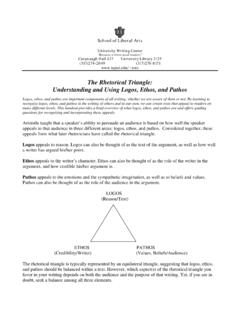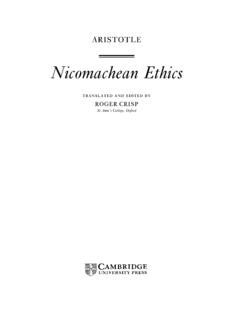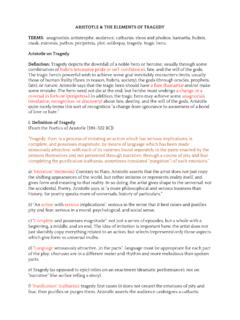Transcription of 8 Aristotle’s Virtue Ethics
1 8 aristotle s Virtue EthicsJohn BowinUniversity of California, Santa Cruz, USAI ntroductionIf there was an ethical turn in Greek philosophy, it began with Socrates, who, unlike hispredecessors, shunned speculation about the natural world and focused exclusively on Ethics ( aristotle , 2).Hisbrandofethicsiswhatwenowcall virtueethics, which, as the name suggests, entails an interest in the character of a moral agent and howit relates to his overall wellbeing. In general, it asks the question how one should live one slife, with an eye to living well through managing one s character. Socrates student Plato(see Plato sSymposium)inheritedthisproject,asdidPla to sstudentAristotle,anditwasthedominant approach to Ethics for the European philosophical schools in the Hellenistic andRomanperiods, as well as for philosophers in Europe and in the Islamic world during theMiddle Ages. TheNicomachean Ethics , aristotle sseminaltreatiseonthesubject,wastrans-la ted into Arabic as early as the ninth centuryCE,andhadaprofoundinfluenceonmedi evalMuslim philosophers such as Alfarabi and Avicenna.
2 This approach to Ethics went intodecline in Europe during the Renaissance and early modern period, perhaps due to a disillu-sionment with its optimistic assumptions about human nature, and was eclipsed by systemsof Ethics that focused on assessments of actions (utilitarianism and deontology) instead ofon agents and their characters. A dissatisfaction with these approaches, in turn, led to arevival of Virtue Ethics in the mid-twentieth century, and that revival continues to this 2020 JohnWiley&Sons, , Ethical TurnMethodologyWhile aristotle may not have invented Virtue Ethics , he can be credited with establishingit as a distinct philosophical discipline. The opening chapters of theNicomachean Ethicswere tremendously influential, both in the European and Arabic philosophical traditions,because they set the terms within which various competing approaches to Virtue ethicshave been debated. That is, aristotle established an enduring framework for Virtue ethicsby proposing a set of plausible assumptions about how it should thought that every science has a domain of objects that it studies, and posits first principles for the domain which explain important features of its objects.
3 Since thedomain relevant to Ethics is human lives and the feature to be explained is their goodness,what Ethics needs to posit as afirst principle is the highest human good orsummum bonum( aristotle ,Eth. ).Oncewehaveourfirstprinciple,claimsAris totle,wewillbeableto understand what makes a human life good, and will be able to aim at bringing this goodlife into being, both for ourselves and our fellow human beings. In fact, aristotle tells usthat theNicomachean Ethicsis meant to supply people who aspire to be politicians with anunderstanding of what they will be trying to achieve, which is to make the lives of thepopulations they serve as good as possible ( b11). How one should go aboutthis is discussed in aristotle AssumptionsThe highest good, then, is a goal that we try to bring about. According to aristotle , it isthe highest good because it is chosen for its own sake, and it is for its sake that everythingelse is chosen ( 22).
4 This assumes that goods are ranked teleologically, so thatif we choose goodxfor the sake of goody,andgoodyfor the sake of goodz,thengoodzis the highest good in the series, followed byyand are related to each other in this way, so that they form a simple order terminating ,butpresumablythinksit is unproblematic because it is generally agreed that there is such a good and it is called eudaimonia orhappiness( 26).Wechoosehappinessforitsownsakeandnot for the sake of anything else, and everything we do is ultimately for the sake of fact, aristotle claims it is a truism to say that the highest good is called eudaimonia because eudaimonia justmeansthehighestgoodinthissense( 24). aristotle expresses the assumption thateudaimoniais the highest good by saying that itisteleion,orsomethingfinalinthesenseth ateverythingischosenforthesakeofeudaimon iaandeudaimoniais not chosen for the sake of anything else ( 30). Butteleionalso means complete in the sense of encompassing everything of intrinsic and not mereinstrumental worth.
5 aristotle says we choose, for instance, honour, pleasure, reason,and every Virtue for the sake ofeudaimonia,butalsofortheirownsakesandn otjustas means toeudaimonia( 5). Soeudaimonia,beingteleion,willincludethe segoods as constituents. This assumption was controversial and not universally , like Alfarabi in the Middle Ages, insisted that ethical Virtue is just a means toeudaimonia,andnotagoodinitself(Alfarab i2015,63 64).Others,liketheStoicsintheAristotle s Virtue Ethics3 Hellenistic period, held honor and pleasure to be goods in themselves but excluded themfromeudaimonia(Seneca,Ep. , ; Cicero,Tu s ).Onlygoodsofthesoullikeunderstanding and Virtue , they thought, could be parts ofeudaimonia,whilegoodslikethese, though intrinsically valuable, are incommensurably less valuable than goods of thesoul (Cicero,Fin. ). aristotle was also emphatic that thesummum bonum,thoughanideal,shouldbesome-thing achievable by the average person, and he objected to Plato s Form of the Good,an occult metaphysical object that somehow makes other things good, for failing to beathingofthissort(Eth.)
6 Aristotleclaimsthateudaimoniawill be generallyshared by anyone without a wrecked character and with a modicum of care and attention( 20). This assumption was debated within the European and Arabic philo-sophical traditions, and some differed from aristotle by making thesummum bonumeithervery difficult or impossible to achieve in this life. The Stoics deniedeudaimoniato all butthe perfectly virtuous, who were, as they said, rarer than the phoenix of the Ethiopians (Alexander of Aphrodisias, ).IntheMiddleAges,ThomasAquinas,Alfarabi ,and Avicenna each insisted that while the happiness that aristotle spoke of was achiev-able, it is not thesummum ,theyclaimed,mustconsistin something far loftier than virtuous action, , a direct acquaintance with God (see TheSeptuagint as World Literature and The Qur an (Koran)). Due to the limitations of ourmortal understanding, however, it was held that this sort of happiness is primarily to besoughtin the afterlife.
7 For his part, aristotle did not envisage the soul surviving afterdeath, since he defined the soul as something dependent on the body, , the form of anatural body having life potentially within it ( aristotle ,De 21). aristotle also assumed that not only iseudaimoniasomething achievable by the averageperson, but also that it is something uniquely and characteristically human (Eth. 13). aristotle uses this assumption to rule out a life of pleasure, which hethinks is favored by the common run of humanity as well as by philosophical hedonistslike the Epicureans, because it does not distinguish the greatest human good from goodsof other animals ( 22). This has remained a standard argument againstphilosophical hedonism, though Alfarabi and Avicenna, while affirming thateudaimoniaisunique to human beings, nonetheless claimed the existence of loftier and uniquely humanpleasures not susceptible to aristotle s argument; loftier pleasures associated with thecontemplation of God in the also assumed thateudaimoniamust be an activity, not a state or disposition(hexis), like a Virtue .
8 This follows from aristotle s understanding of what a disposition is,combined with the assumption thateudaimoniais somethingfinal (teleion). Dispositionslike virtues are always for the sake of their corresponding activities. Courage is for thesake of courageous action, otherwise it would be useless. This is why aristotle says thatthough we might praise a virtuous person who is somehow incapacitated ( , physicallydisabled in some way that will prevent him from doing virtuous actions), we save ourcongratulations for those who are courageousandact courageously. Thus, since attainingeudaimoniais an occasion for congratulation and not just praise, it must consist in activity,and not a mere disposition ( aristotle ,Eth. 1099a7).Italsofollowsfromthis thateudaimoniais not a subjective mental state, like a feeling of something you do, not something you merely Ethical TurnNearly everyone in the European and Arabic traditions assumed thateudaimoniamust bean activity, though opinions varied about what this activity consists in.
9 The Stoics, Alfarabiand Avicenna, for instance, each thought that a certain sort of mental activity could sufficeforeudaimonia,whileAristotlebelie vedthatphysicalengagementwiththeworldisa lsonecessary. Perhaps the common motive is that, as aristotle says,eudaimoniais thought tobe something of one s own and not easily taken from one ( 26). What isalways up to us, and does not depend on anyone else, is the manner in which we act, asopposed to anything we might achieve or , aristotle also assumed thateudaimoniamust be something self-sufficient(autark s), which he defines as lacking in nothing that is good. This does not require,absurdly, that the happy person possess every good, but just that he possess every goodthat would make his life better. This is why aristotle says thateudaimoniais self-sufficientby not permitting augmentation by the slightest addition ( 21). Avicennaand Alfarabi follow aristotle in this assumption.
10 Avicenna describes happiness as an actof contemplation taking in the whole of existence, including God, which ensures thatit is maximally complete and excellent (Avicenna2005,350).AndAlfarabi,thoughhet alks at times of degrees of happiness, nevertheless insists that there is an ultimate level ofhappiness that corresponds to the perfection of our rational faculty (Alfarabi2015,33). aristotle qualifies the claim thateudaimoniais self-sufficient because, as we have seen,eudaimoniais something uniquely and characteristically human, and the wordautark scar-ries with it a strong connotation of divinity. aristotle says, by self-sufficient we do notmean that which is sufficient for a man by himself, for one who lives a solitary life, but alsofor parents, children, wife, and in general for his friends and fellow citizens, since man is bynature a political [animal] ( aristotle ,Eth. 11).Thatmanisapoliticalanimal is repeated in thePolitics,whereAristotlelikensahumanbe ingtoapieceinaboardgame because, just as being part of a game is constitutive of being a game piece, being partof society is constitutive of being a human being.














